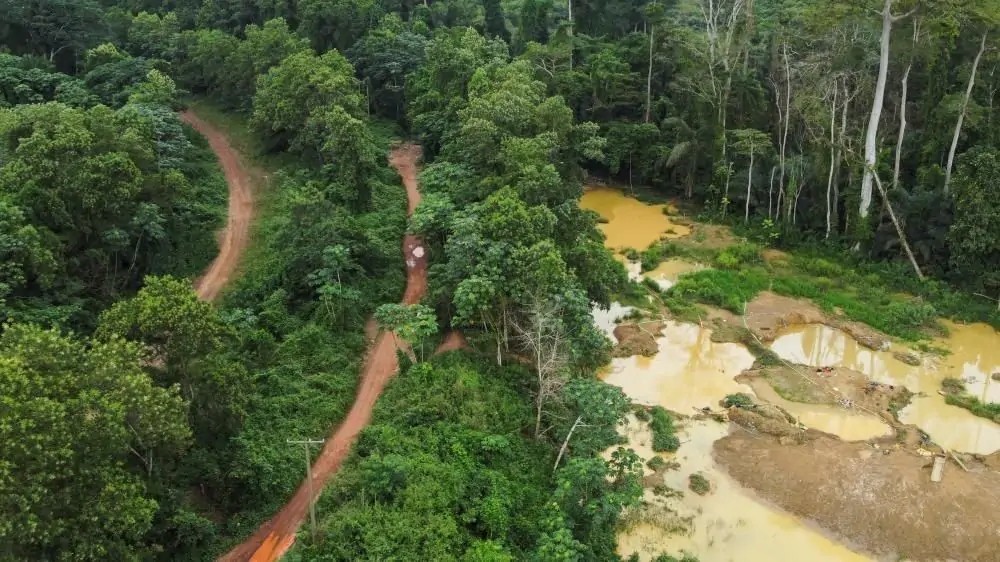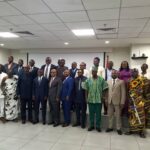The battle against illegal mining, commonly known as galamsey, continues to be one of Ghana’s most pressing national crises.
Despite efforts by successive governments to curb this environmental menace, illegal mining remains a deep-rooted problem, threatening Ghana’s water bodies, forests, and agricultural lands.
The situation demands not just political will but a swift, decisive, and sustained approach to rescue the country from environmental and economic devastation.
Against this backdrop, Ing. Dr. Kenneth Ashigbey, Convener of the Media Coalition Against Illegal Mining, has once again sounded the alarm on the escalating dangers of the menace, emphasizing the need for immediate, resolute action by the new administration.
His latest call is not only a reminder of past failures but a wake-up call to the new government to demonstrate unwavering commitment to ending the galamsey scourge.
Dr. Ashigbey, in his remarks, highlighted the grave reality of illegal mining activities, particularly in Ghana’s forest reserves and water bodies.
According to him, while there have been some good interventions by the new administration that are commendable, the overall situation has not significantly improved.
To him, the devastating impact of galamsey on Ghana’s water resources cannot be overstated, adding that the shutdown of the Bonsa Water Treatment Plant due to pollution is a glaring example of the consequences of illegal mining.
Similarly, Dr Ashibey noted that water supply challenges in Cape Coast and other areas signal a crisis that could escalate into a full-blown catastrophe if urgent steps are not taken.
The financial cost of reversing the damage according to Dr Ashigbey is staggering, asserting that rehabilitating degraded lands costs approximately $40,000 per hectare, a burden that the Ghanaian taxpayer will ultimately bear.
More critically, Dr Ken Ashigbey pointed out that the health implications of water contamination, mercury poisoning, and other hazardous chemicals used in illegal mining activities pose long-term threats to public health.
Political Will; The Missing Ingredient:
Dr. Ashigbey did not mince words in addressing the elephant in the room: political complicity. He pointed out that politically exposed individuals are key players in the galamsey business, shielding the criminal network from accountability.
The failure of the previous administration to act decisively against high-profile figures linked to illegal mining sends the wrong signals, demanding decisive action from the new NDC administration to end such levels of impunity.
“And so for me, I would have expected a bit more decisive action from his excellency, the president, when the Aowin MP, for example, was fingered by the traditional authority as being involved in Galamsey, and he also said he was not involved, but also countered it with another allegation, you would have expected his excellency, the president, who on July 7, had indicated that he was not going to tolerate the kingpins, and that was his word, implying that they were the people he’s going to go after—You would have been expecting that his excellency would have publicly ordered an investigation into that particular inquiry. Also, the NDC, constituency chairman in Ellembelle constituency, was also accused of one, by one of the large scale miners, of being engaging Galamsey in their constituency of engaging in illegal mining, and did not elicit the kind of swift action that is needed to deter others.’
Even more troubling is the case of Akonta Mining, a company allegedly linked to the NPP’s Ashanti Regional Chairman, which was accused by the former Minister of Lands and Natural Resources of engaging in illegal mining.
Despite public outcry and petitions to the Inspector General of Police (IGP), there has been no significant progress in holding those responsible to account.
Per Ing. Ken Ashigbey’s assertion, the lack of prosecutions and the continued presence of politically connected individuals in the galamsey business raise serious concerns about whether the fight against illegal mining is truly being taken seriously.
While there have been reports of recent raids and arrests, Dr. Ashigbey is adamant that these actions are not enough.
He pointed out that every day an excavator remains in a forest reserve, irreversible damage is being done, stressing that reclaiming degraded lands costs approximately $40,000 per hectare, a financial burden that Ghana cannot afford to bear indefinitely.
He emphasized that the environmental damage, poisoning of water bodies with mercury and cyanide, and health crises stemming from polluted water sources make it clear that half-measures will not suffice.
A Call for a State of Emergency:
Given the severity of the situation, Dr. Ashigbey and the Media Coalition Against Illegal Mining have called for the declaration of a state of emergency in all forest reserves affected by galamsey.
This measure, he argued, is necessary to facilitate the swift deployment of security forces and allow the government to take extraordinary measures to reclaim and protect affected areas.
According to Dr Ken Ashigbey, the call for a state of emergency is not new, adding that when in opposition, the NDC supported similar calls, acknowledging the need for drastic action.
For him, now that the NDC is in government, it is time for them to act on such a commitment, asserting that a state of emergency would provide the legal and operational framework to dismantle illegal mining networks, seize equipment, and prosecute offenders without the usual bureaucratic delays.
The Media Coalition Against Illegal Mining has long advocated for a more radical approach, including declaring a state of emergency in heavily affected forest reserves and water bodies, currently strategizing new approaches to pressure the government into fulfilling its obligations. These initiatives highlight the frustration of the Ghanaian people, who continue to suffer the consequences of government inaction.
In reaction to Dr. Ashigbey’s concerns, the Minister of Environment, Science, and Technology, Hon. Ibrahim Murtala Mohammed, defended the new government’s approach, emphasizing that it is barely two months old and still in the process of implementing its policies.
According to him, the repeal of Legislative Instrument (LI) 2462, a legal framework that has been a major barrier in the fight against illegal mining, is already in motion.
He assured Ghanaians that the new administration remains committed to delivering on its promise within the first 120 days.
However, while the repeal of LI 2462 is a positive step, it is insufficient in itself to solve the problem. The government must go beyond policy amendments and demonstrate real political will by aggressively pursuing and prosecuting those involved in illegal mining, regardless of their political affiliation or financial influence.
To truly tackle the galamsey crisis, the new administration must move beyond rhetoric and take the following bold actions: prosecute politically exposed persons: The government must send a strong signal by investigating and prosecuting all individuals, regardless of their political connections, who are found complicit in illegal mining.
This includes cases such as Akonta Mining, the Aowin MP, and other high-profile figures accused of engaging in or facilitating galamsey.
Among several other decisive actions, the new administration must declare a State of Emergency in affected areas. A special security operation should be launched in all forest reserves and water bodies that have been ravaged by galamsey. A state of emergency would empower law enforcement agencies to take swift and decisive action.
The government must also adequately equip task forces fighting illegal mining as reports that security personnel are outnumbered and outgunned by illegal miners are unacceptable. A well-resourced, technology-driven security response is needed to combat this threat.
Additionally, the legal framework must be strengthened to impose severe penalties on individuals and companies involved in galamsey. This includes long-term prison sentences and the seizure of assets acquired through illegal mining.
Finally, the government should publish a list of all persons and companies being investigated or prosecuted for illegal mining. This will increase public confidence in the fight against galamsey and deter others from engaging in it.
The government must equally work with local communities to provide alternative livelihoods for those engaged in galamsey. Without viable economic alternatives, efforts to curb illegal mining will face resistance from affected communities.
The new government has a rare opportunity to prove that it is serious about fighting galamsey. This is not just an environmental issue—it is a matter of national survival.
The devastating effects of illegal mining on Ghana’s water supply, food security, and public health demand immediate, bold, and uncompromising action.







